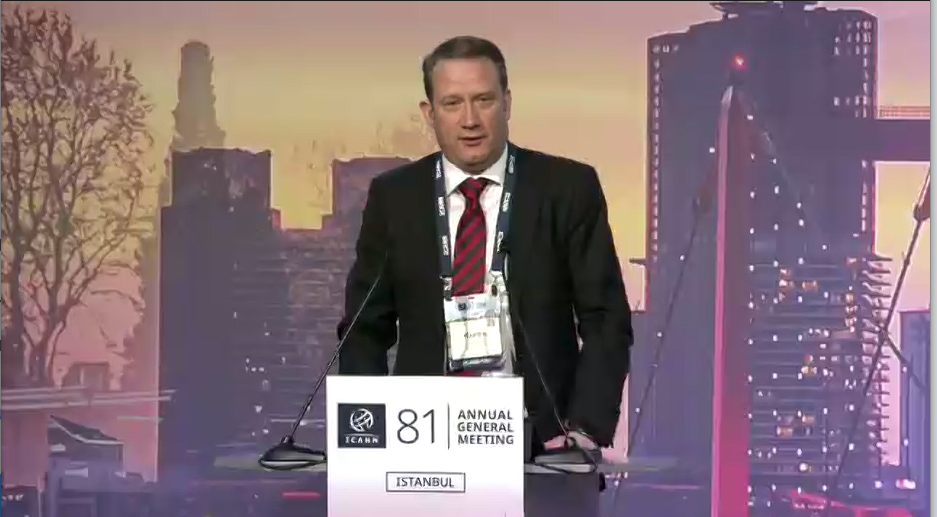
Thursday 14 November saw the close of the 81st ICANN Summit, the Internet’s governing body. The summit took place on the banks of the Bosphorus between Asia and Europe, in Istanbul, Turkey. This summit is the last meeting of the global Internet community for the year 2024 before turning to 2025.
Tripti Sinha, who has just been reappointed Chair of the ICANN Board of Directors, opened her remarks at the Opening Ceremony of the 81st ICANN Summit with the observation: ‘The past year (editor’s note: 2024) has been a complicated for ICANN’.
ICANN, an organisation challenged on several fronts
Tensions between Russia, China and the West have never been so high. A geopolitical context that is putting the multipartite model of a globalised Internet under pressure, as ICANN is an organisation governed by American law, even if it claims to be apolitical. The conflict in the Middle East is never far away either. In particular, it has resurfaced at previous ICANN summits this year. Challenged about its role and legitimacy, ICANN is also faced with the change of presidency in the White House with a second term for Donald Trump, which gave rise to some unusual questions at the public forum that closed the summit. One participant referred to the unpredictability of the future President of the United States, which ‘increases the risk of conflict’, going so far as to wonder whether ‘ICANN can take control of American military systems’. While the answer to this question is, of course, no, Tripti Sinha has also raised the issue of ICANN’s liability, with legal action being taken against ICANN, and financial challenges, speaking of ‘financial difficulties’. ICANN’s operating costs have risen significantly in recent years, partly as a result of inflation. Inflation has led to significant increases in domain name prices, which in turn have led to a downturn in the market. ICANN, which derives part of its resources from domain names in return for a tax on each generic domain name, has also been affected.
A transition of presidency at the head of the organisation

At the opening of the summit, Erik Lindqvist, the future President of ICANN, gave a short speech to introduce himself and talk about his career. He will officially take up his new post on 9 December, taking over from Sally Costerton, who was applauded for her successful interim role.
Among the tasks expected of the new President, who will be based in Geneva, Switzerland, is a review of the organisation’s financial situation. Avenues for savings and new sources of funding were discussed, and a number of clear-cut opinions emerged. For example, should attendance at summits be made fee-paying, or should the venues chosen for these international meetings be rationalised to generate savings? The interaction of the new President with the various bodies is also expected and acclaimed. Defending the multi-stakeholder governance model in the current difficult context and ICANN’s ethical policies are two other important issues raised by the contracting parties.
New series of new generic extensions confirmed for 2026
Among the difficulties, ICANN must also succeed with the new series of new generic extensions. First of all, this means meeting the April 2026 deadline for the application window, a date that has been hammered home for several summits. Reassuringly, the recommendations of the Subsequent Procedures (Subpro) policy development process are being implemented at a good pace. The future application guide is on schedule, with a final version due to be delivered within a year. The future registry contract for new registry operators is also being considered. Unlike the candidates for the 2012 round, this new contract should be a single document covering all types of TLDs: open, community, brand and internationalised (editor’s note: in native language). It will include fourteen specifications, compared with the current thirteen, with the fourteenth covering TLD variants for multilingual TLDs.
Other issues on which ICANN reached a decision, there should be no private auctions to decide between candidates for the same TLD in 2026. Like a symbol or perhaps a marker, at the very end of the summit, the ICANN Board adopted the applicant support program for future applicants, a program that will involve a communications campaign in disadvantaged geographical areas at the beginning of 2025.
Capitalising on experience feedback
A number of issues recently initiated by ICANN are currently being evaluated. These include abuse of the domain name system. In April 2024, specific obligations came into force to compel registries and registrars to take action in the event of clear abuse. ICANN81 provided an opportunity to take stock of these measures after an initial six-month implementation phase. ICANN Compliance reports that it has initiated 363 complaints, often involving several domain names. Unsurprisingly, the most common abuses involved phishing campaigns.
Another element being tested is the Registration Data Request Service (RDRS). This is a prototype designed to gauge interest in a standardised platform for submitting and processing requests for access to domain name registration data for legitimate purposes. Over the course of a year, the RDRS collected requests for 13,000 names, a volume that remains low compared to the 170 million generic names. A related issue is the depreciation of the Whois protocol for domain name registration databases. This protocol, which has been in use since the 1980s, is due to give way to the RDAP protocol for generic domain names at the end of January 2025. ICANN Org has pointed out, however, that this new protocol is very rarely correctly deployed at this stage.
The tense international context was largely reflected at this summit on an organisation that will be starting 2025 with a new president at its head and a change of administration in the White House. ICANN has made no secret of the fact that it is facing a number of difficulties. The success of the next series of new gTLDs, a series that will have taken fourteen years to complete between 2012 and 2026, will be decisive in helping the organisation to emerge from this turbulent period. The stakes are high, firstly because ICANN is committed to holding this series in April 2026. A postponement of the date would further damage its credibility.
This series is also important given the investment required to prepare and hold it. The significantly higher application fees than in 2012, with a base amount of USD 227,000, may act as a brake. Investors, for their part, may not appreciate the abolition of private auctions to decide between applicants for the same TLD, with ICANN seeking, on the contrary, to curb speculation. Nameshield, for its part, is convinced of the merits of this new round and, in particular, of dot brand extensions, the benefits of which will more than offset the investment required if applicants are properly accompanied. Nameshield is ready to help future project owners by providing them with a complete solution for their entire project cycle. If you have an Internet extension project, contact our experts who will be delighted to support you.
Image source : ICANN’s website










